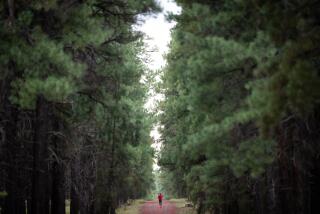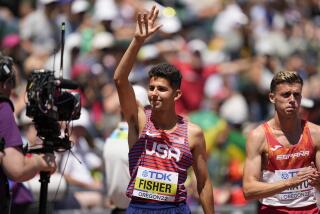FEELING THE HEAT IN BARSTOW : Steve Ortiz Hopes to Run Away From Desert--Again
- Share via
BARSTOW — Welcome to the middle of nowhere.
In the oppressive heat of the vast Mojave Desert lies Barstow, a small oasis of 20,000. This is a working-class community, and about 80% of the jobs are military oriented from a Marine supply depot outside of town to the Ft. Irwin army base 11 miles to the north.
The weather-worn locals are resistant to change, and life, as it is on the Outside, is a bit foreign.
Old values, like the people, persevere, though.
Steve Ortiz, a Barstowian of some reknown, understands this well.
Ortiz lives and runs here under the seething sun. Ortiz endures 100-degree afternoons, rattle snakes and dehydration as well as could be expected.
But he also has had to endure the backward ideals that permeate this town like the suffocating heat. Change is slower than the mile-long freight trains that roll through town on the way to L.A. Or is it Salt Lake City?
As a national-class distance runner for Grossmont College in San Diego and UCLA, Ortiz has been to the other world. And he liked it.
But he has returned to Barstow, where he was an 8-minute 55-second two-miler and Southern Section cross-country champion at Kennedy High School. He has returned because to remain a competitive runner he must live at home. Ortiz is not working; he said he will move to L.A. if he can obtain shoe company sponsorship, which is legal under guidelines set forth by the International Amateur Athletic Federation.
Thus, Ortiz has assimilated into the Barstow life style about as well as a country bumpkin would at the Hard Rock Cafe. His clothes, his trendy haircut--short and curly in the front and long in the back--just don’t cut it here.
Since graduating from UCLA in 1984, Ortiz has had to endure some painful questions.
To his neighbors, who toil long and hard for the military, running is not the sort of endeavor a 26-year-old man should be doing.
“They grumble when I run by,” Ortiz said. “ ‘Why don’t you have a job? You’re not working. Are you lazy?
“It’s really hard on me because I tried to be as fair as I can be and down to earth as possible, but people here are just hard core. They don’t respond. ‘You’re 26 years old. You’re not working. What’s wrong with you?’
“I say, ‘Well, I am working.’ In my point of view. I’m working for the Olympics (in 1988).
“This place is like you work and you get married when you’re 18. I’m not married. They say, ‘Well, why aren’t you married? Is there something wrong with you?’ ”
In Barstow, Ortiz’s life seems a bit skewed. But in L.A. he would be just another single guy enjoying life.
At UCLA, Ortiz was living in a fantasy world as far as neighbors were concerned. He was in a fraternity, the captain of the track team and an All-American in cross-country and track and field.
“I didn’t want to graduate,” he said. “It was paradise for me. Then all of a sudden I came back to the real world.”
Once, for example, Ortiz was in a parade in town and wore a blazer. He didn’t think twice about it. Getting dressed up seemed natural.
“People were saying, ‘What do you think this is, the Rose Bowl Parade?,’ ” Ortiz said. “I was embarrassed. I wanted to go home and put it in the closet. I forgot how I fit in.”
Another time, Ortiz was running one his favorite routes, an 11-mile out-and-back trek through the desert. It was during the pollen season and Ortiz, who suffers from allergies, ran out of gas right at the turn around point. He knocked at a nearby home and asked to use the phone to call his father.
“The man wouldn’t let me in,” Ortiz said. “I said, ‘I just got through running six miles and I can’t run anymore. I’ve got to go home.’ ”
Finally, the man let Ortiz inside, but he kept a wary eye on him.
At times, Ortiz found himself an unwanted outsider on the track, too.
At the 1982 NCAA meet at Provo, Utah, Ortiz was the only American runner in the 10,000-meter field. The starting line resembled a meeting of the United Nations, not the American collegiate championships.
With four laps to go in the 25-lap race, Ortiz was with a group of seven older, more experienced African runners. Included among them were Joseph Nzau of Wyoming and Kenya and Suleiman Nyambui of Texas El Paso and Tanzania.
Nyambui, a senior in his last NCAA meet, was after his fourth consecutive 10,000 title. Only the late Steve Prefontaine won four NCAA titles in the same event. He won the 5,000 from 1970-73.
Nyambui also was trying for an unprecedented 14th NCAA individual championship in indoor and outdoor track and cross-country.
And Ortiz was intruding.
The other runners who knew it let Ortiz know it, too.
“There was a mile to go,” said Ortiz. “And they went into their act.”
It included a shove here, an elbow there. In a close pack, contact between runners is not uncommon.
Often, it is a deliberate attempt to disrupt another runners’ concentration.
And it worked for the Africans.
They had Ortiz flustered, out in the third lane, and Nyambui strode to victory in 29:03.54, his perfect NCAA 10,000 record intact.
Ortiz was a frustrated sixth-place finisher. Afterward he tried to pick a fight with Nzau, whom he thought was the main antagonist.
Now, Ortiz said he realizes the race was just a lesson for future international meets.
In fact, 1982 could have been Ortiz’s breakthrough season.
At The Athletics Congress national championships, Ortiz and Craig Virgin, the former American 10,000-meter record holder, broke from the pack and sprinted the final 800 meters together.
Virgin won by a body-length in 28:33.02. Still, it was Ortiz’s finest finish in a national meet.
He qualified for the U.S. National team that competed in dual meets against the Soviet Union and East Germany.
He returned from Europe a little cocky.
He started paying more attention to his social calendar then to his training schedule. This wasn’t totally out of character for Ortiz.
He just overdid it.
“I forgot how hard I worked to get where I had gotten,” Ortiz said.
It cost him dearly as the 1983 season was a disaster. His best time in the 5,000 was 14:00, which didn’t even qualify him for the TAC nationals.
It wasn’t helping that his friends, and anyone else who knew him back in Barstow, said: “Look, why don’t you stop. Get married and get a real job.”
Even his parents wondered when he was going to settle down.
Hurt and frustrated, Ortiz contemplated quiting.
At Westwood in the fall of ‘83, while finishing a degree in sociology, something clicked.
Ortiz thought, “I’m not even going to qualify for the trials.”
That stung him. As a junior at UCLA he’d run in the 1980 trials, finishing seventh in the 5,000 and 10,000 meters. So, in early ‘84, Ortiz intensified his workouts and eventually qualified in both events.
Though he failed to make the U.S. Olympic team, his performance motivated him to continue running.
If he could run that well on just four months of strenuous training, what could he do with two seasons of serious running?
Thus the seeds of his preparation for the 1988 Seoul Games were thrown.
Since then he’s run better than ever.
He set a personal best of 13:32 for 5,000 early this season. He won the Lloyd’s Boulevard 8-kilometer run at San Diego last month, beating former University of Arizona All-American Thom Hunt by 30 seconds. Hunt is one of the best road racers in the U.S.
Later in July he won the Santa Cruz Boardwalk 5.4-mile race over Bay Area standout Ivan Huff.
Running was Ortiz’s ticket out of Barstow and into the good life as a scholarship athlete.
Steve’s father, Rudy, a retired Marine, didn’t have the funds to his son to UCLA; running made it possible.
It also made Rudy Ortiz proud to see what his son could do if given a chance, a chance he could get only outside of Barstow.
“I could die right now and I’d be fulfilled,” Rudy Ortiz said. “I so proud of my son.”
Steve’s two years at Grossmont and four at UCLA gave him another point of view, one a trifle different than the Barstow experience.
Now that he has returned home to begin training for the 1988 Olympics, he’s reminded how difficult it is to come home.
It’s not that the town has turned their backs to him. After all, he’s the closest thing to a sports hero they’ve got.
It’s just they’re not as open-minded about him as Ortiz would like.
If only the denizens of Barstow would understand that all those long, solitary runs into the desert are work.
That his running is as hard as marching or guiding a tank through the desert.
Just different, like Ortiz.
More to Read
Go beyond the scoreboard
Get the latest on L.A.'s teams in the daily Sports Report newsletter.
You may occasionally receive promotional content from the Los Angeles Times.










